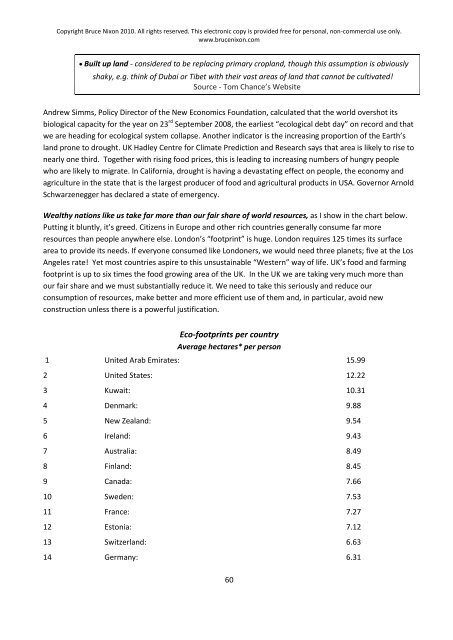A better world is possible - Global Commons Institute
A better world is possible - Global Commons Institute
A better world is possible - Global Commons Institute
Create successful ePaper yourself
Turn your PDF publications into a flip-book with our unique Google optimized e-Paper software.
Copyright Bruce Nixon 2010. All rights reserved. Th<strong>is</strong> electronic copy <strong>is</strong> provided free for personal, non-commercial use only.<br />
www.brucenixon.com<br />
Built up land - considered to be replacing primary cropland, though th<strong>is</strong> assumption <strong>is</strong> obviously<br />
shaky, e.g. think of Dubai or Tibet with their vast areas of land that cannot be cultivated!<br />
Source - Tom Chance’s Website<br />
Andrew Simms, Policy Director of the New Economics Foundation, calculated that the <strong>world</strong> overshot its<br />
biological capacity for the year on 23 rd September 2008, the earliest “ecological debt day” on record and that<br />
we are heading for ecological system collapse. Another indicator <strong>is</strong> the increasing proportion of the Earth’s<br />
land prone to drought. UK Hadley Centre for Climate Prediction and Research says that area <strong>is</strong> likely to r<strong>is</strong>e to<br />
nearly one third. Together with r<strong>is</strong>ing food prices, th<strong>is</strong> <strong>is</strong> leading to increasing numbers of hungry people<br />
who are likely to migrate. In California, drought <strong>is</strong> having a devastating effect on people, the economy and<br />
agriculture in the state that <strong>is</strong> the largest producer of food and agricultural products in USA. Governor Arnold<br />
Schwarzenegger has declared a state of emergency.<br />
Wealthy nations like us take far more than our fair share of <strong>world</strong> resources, as I show in the chart below.<br />
Putting it bluntly, it’s greed. Citizens in Europe and other rich countries generally consume far more<br />
resources than people anywhere else. London’s “footprint” <strong>is</strong> huge. London requires 125 times its surface<br />
area to provide its needs. If everyone consumed like Londoners, we would need three planets; five at the Los<br />
Angeles rate! Yet most countries aspire to th<strong>is</strong> unsustainable “Western” way of life. UK’s food and farming<br />
footprint <strong>is</strong> up to six times the food growing area of the UK. In the UK we are taking very much more than<br />
our fair share and we must substantially reduce it. We need to take th<strong>is</strong> seriously and reduce our<br />
consumption of resources, make <strong>better</strong> and more efficient use of them and, in particular, avoid new<br />
construction unless there <strong>is</strong> a powerful justification.<br />
Eco-footprints per country<br />
Average hectares* per person<br />
1 United Arab Emirates: 15.99<br />
2 United States: 12.22<br />
3 Kuwait: 10.31<br />
4 Denmark: 9.88<br />
5 New Zealand: 9.54<br />
6 Ireland: 9.43<br />
7 Australia: 8.49<br />
8 Finland: 8.45<br />
9 Canada: 7.66<br />
10 Sweden: 7.53<br />
11 France: 7.27<br />
12 Estonia: 7.12<br />
13 Switzerland: 6.63<br />
14 Germany: 6.31<br />
60
















